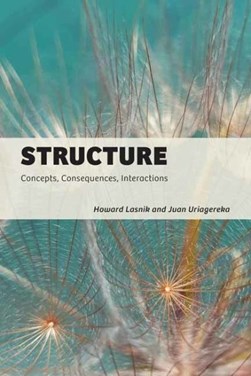-
BROWSE 1000s OF BOOKS IN STOCK
-
FREE DELIVERY ON ORDERS OVER €10
Structure
PAPERBACK
Howard Lasnik and Juan Uriagereka "were there" when generative grammar was being developed into the Minimalist Program. In this presentation of the universal aspects of human language as a cognitive phenomenon, they rationally reconstruct syntactic structure. In the process, they touch upon structure dependency and its consequences for learnability, nuanced arguments (including global ones) for structure presupposed in standard linguistic analyses, and a formalism to capture long-range correlations. For practitioners, the authors assess whether "all we need is Merge," while for outsiders, they summarise what needs to be covered when attempting to have structure "emerge." Reconstructing the essential history of what is at stake when arguing for sentence scaffolding, the authors cover a range of larger issues, from the traditional computational notion of structure (the strong generative capacity of a system) and how far down into words it reaches, to whether its variants, as evident across the world's languages, can arise from non-generative systems. While their perspective stems from Noam Chomsky's work, it does so critically, separating rhetoric from results. They consider what they do to be empirical, with the formalism being only a tool to guide their research (of course, they want sharp tools that can be falsified and have predictive power). Reaching out to sceptics, they invite potential collaborations that could arise from mutual examination of one another's work, as they attempt to establish a dialogue beyond generative grammar.
€62.35

187 Reward Points
In stock online
Extended Range: Delivery in 2-3 working days
Extended Range: Delivery in 2-3 working days
Free Delivery on this item
Any purchases for more than €10 are eligible for free delivery anywhere in the UK or Ireland!
Howard Lasnik and Juan Uriagereka "were there" when generative grammar was being developed into the Minimalist Program. In this presentation of the universal aspects of human language as a cognitive phenomenon, they rationally reconstruct syntactic structure. In the process, they touch upon structure dependency and its consequences for learnability, nuanced arguments (including global ones) for structure presupposed in standard linguistic analyses, and a formalism to capture long-range correlations. For practitioners, the authors assess whether "all we need is Merge," while for outsiders, they summarise what needs to be covered when attempting to have structure "emerge." Reconstructing the essential history of what is at stake when arguing for sentence scaffolding, the authors cover a range of larger issues, from the traditional computational notion of structure (the strong generative capacity of a system) and how far down into words it reaches, to whether its variants, as evident across the world's languages, can arise from non-generative systems. While their perspective stems from Noam Chomsky's work, it does so critically, separating rhetoric from results. They consider what they do to be empirical, with the formalism being only a tool to guide their research (of course, they want sharp tools that can be falsified and have predictive power). Reaching out to sceptics, they invite potential collaborations that could arise from mutual examination of one another's work, as they attempt to establish a dialogue beyond generative grammar.

187 Reward Points
Any purchases for more than €10 are eligible for free delivery anywhere in the UK or Ireland!
€62.35

187 Reward Points
Any purchases for more than €10 are eligible for free delivery anywhere in the UK or Ireland!
Product Description
Howard Lasnik and Juan Uriagereka "were there" when generative grammar was being developed into the Minimalist Program. In this presentation of the universal aspects of human language as a cognitive phenomenon, they rationally reconstruct syntactic structure. In the process, they touch upon structure dependency and its consequences for learnability, nuanced arguments (including global ones) for structure presupposed in standard linguistic analyses, and a formalism to capture long-range correlations. For practitioners, the authors assess whether "all we need is Merge," while for outsiders, they summarise what needs to be covered when attempting to have structure "emerge." Reconstructing the essential history of what is at stake when arguing for sentence scaffolding, the authors cover a range of larger issues, from the traditional computational notion of structure (the strong generative capacity of a system) and how far down into words it reaches, to whether its variants, as evident across the world's languages, can arise from non-generative systems. While their perspective stems from Noam Chomsky's work, it does so critically, separating rhetoric from results. They consider what they do to be empirical, with the formalism being only a tool to guide their research (of course, they want sharp tools that can be falsified and have predictive power). Reaching out to sceptics, they invite potential collaborations that could arise from mutual examination of one another's work, as they attempt to establish a dialogue beyond generative grammar.
Product Details
ISBN9780262544542
FormatPAPERBACK
PublisherTHE MIT PRESS (30 November. 2022)
No. of Pages248
Weight310
Language English
Dimensions 229 x 152 x 31

